1 词义的选择和引申
词义的选择、引申和褒贬
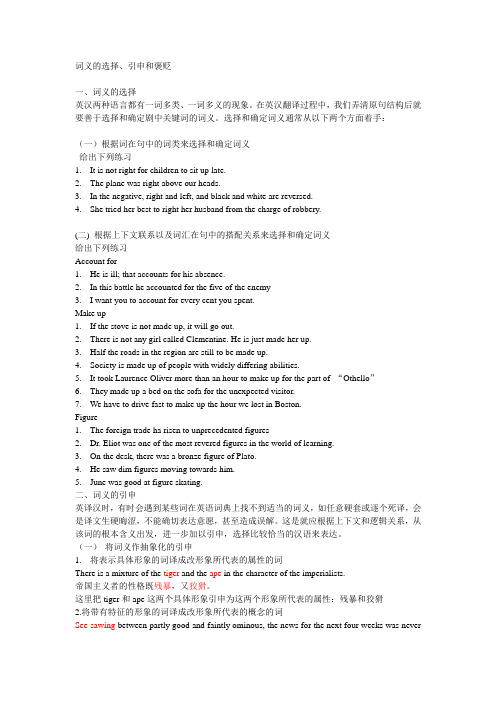
词义的选择、引申和褒贬一、词义的选择英汉两种语言都有一词多类、一词多义的现象。
在英汉翻译过程中,我们弄清原句结构后就要善于选择和确定剧中关键词的词义。
选择和确定词义通常从以下两个方面着手:(一)根据词在句中的词类来选择和确定词义给出下列练习1.It is not right for children to sit up late.2.The plane was right above our heads.3.In the negative, right and left, and black and white are reversed.4.She tried her best to right her husband from the charge of robbery.(二) 根据上下文联系以及词汇在句中的搭配关系来选择和确定词义给出下列练习Account for1.He is ill; that accounts for his absence.2.In this battle he accounted for the five of the enemy3.I want you to account for every cent you spent.Make up1.If the stove is not made up, it will go out.2.There is not any girl called Clementine. He is just made her up.3.Half the roads in the region are still to be made up.4.Society is made up of people with widely differing abilities.5.It took Laurence Oliver more than an hour to make up for the part of “Othello”6.They made up a bed on the sofa for the unexpected visitor.7.We have to drive fast to make up the hour we lost in Boston.Figure1.The foreign trade ha risen to unprecedented figures2.Dr. Eliot was one of the most revered figures in the world of learning.3.On the desk, there was a bronze figure of Plato.4.He saw dim figures moving towards him.5.June was good at figure skating.二、词义的引申英译汉时,有时会遇到某些词在英语词典上找不到适当的词义,如任意硬套或逐个死译,会是译文生硬晦涩,不能确切表达意愿,甚至造成误解。
词义的选择与引申

9). I have butterflies in my stomach. 10). When I heard the news my heart came into my mouth.
9). I have butterflies in my stomach. 译文一:我胃痛。 译文二:我有一种想呕吐的感觉。 译文三:我好紧张。 10). When I heard the news my heart came into my mouth. 译文一:当我听到这个消息时,我心都跳 出来了。 译文二:当我听到这个消息时,我很吃惊。 译文三:当我听到这个消息时,我吓死了。
6 )Every life has its roses and thorns.
6 )Every life has its roses and thorns. 译文一:生活中既有鲜花又有芒刺(荆 棘)。 译文二:每个人的生命都其玫瑰和刺。 译文三:生活总会跌荡起伏。(有平坦和 坎坷的时候) 译文四:人生总是有两面性的。
参考译文: 1. 我父亲是那家餐馆的常客, 那里所有的服 务员都认识他. 2. 请看一下上次会议的记录. 3. 在中国我们每到一个城市, 就逛大街, 逛 商店, 逛公园, 上剧院, 下饭馆.
练习分析
5). There is a mixture of the tiger and the ape in the character of the imperialists.
参考译文: 5. 帝国主义者的性格既残暴, 又狡猾. 6.每个人的生活都是有甜有苦. 7. 我们都被他那种崇高的气质所打动了. . 10. 听到这个消息我吓得要命.
二 词义的引申
词义的选择、引申、褒贬
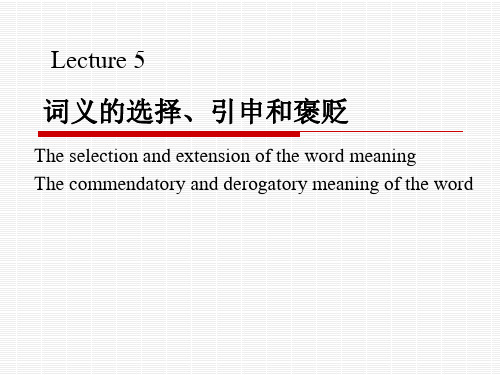
词义引申(具体——抽象)
Grey hair should be respected(synecdoche) The pen is mightier than the sword. (metonymy) The invention of machinery had brought into the world a new era---the Industrial Age. Money had become King. (metonymy) 机器的发明使世界进入到一个新纪元即工业时 代,金钱成了主宰一切的权威。 He is a rolling stone. I don’t think he can go far. 他是个见异思迁的人,我想他不会有多大出息。
三、词义的褒贬
有些词义是中立的,本身不表示褒义或者贬义, 但在一定的上下文中可能有褒贬的意味. demanding He found that being a CEO was a demanding job. 他发现当首席执行官是个费力的工作。 As a demanding boss, he expected total loyalty and dedication from his employers. 他是个苛刻的老板,要求手下的人对他忠心耿 耿,鞠躬尽瘁。
小结(summary)
词义的选择: 根据词性来选择词义(word meaning) 根据上下文来选择词义(context) 根据搭配关系来选择词义(collocation)
二、词义的引申(extension)
引申的方法:抽象化引申 & 具体化引申 抽象化引申:具体——抽象 Do you think this dictionary of English is the supreme court in all matters concerning English words? 你认为这本英语词典是英语词汇的权威词典吗? See-sawing between partly good and faintly ominous, the news for the next four weeks was never distinct. 在那以后的四个星期内,消息时而部分有所好转,时而 又有点不妙,两种情况不断地交替出现,一直没有明朗 化。
词义选择和词义引申
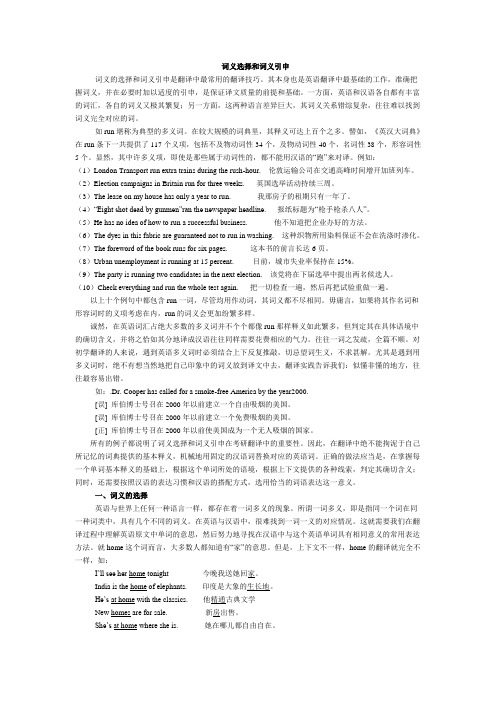
词义选择和词义引申词义的选择和词义引申是翻译中最常用的翻译技巧。
其本身也是英语翻译中最基础的工作,准确把握词义,并在必要时加以适度的引申,是保证译文质量的前提和基础。
一方面,英语和汉语各自都有丰富的词汇,各自的词义又极其繁复;另一方面,这两种语言差异巨大,其词义关系错综复杂,往往难以找到词义完全对应的词。
如run堪称为典型的多义词。
在较大规模的词典里,其释义可达上百个之多。
譬如,《英汉大词典》在run条下一共提供了117个义项,包括不及物动词性34个,及物动词性40个,名词性38个,形容词性5个。
显然,其中许多义项,即使是那些属于动词性的,都不能用汉语的“跑”来对译。
例如:(1)London Transport run extra trains during the rush-hour. 伦敦运输公司在交通高峰时间增开加班列车。
(2)Election campaigns in Britain run for three weeks. 英国选举活动持续三周。
(3)The lease on my house has only a year to run. 我那房子的租期只有一年了。
(4)“Eight shot dead by gunmen”ran the newspaper headline.报纸标题为“枪手枪杀八人”。
(5)He has no idea of how to run a successful business. 他不知道把企业办好的方法。
(6)The dyes in this fabric are guaranteed not to run in washing. 这种织物所用染料保证不会在洗涤时渗化。
(7)The foreword of the book runs for six pages. 这本书的前言长达6页。
(8)Urban unemployment is running at 15 percent. 目前,城市失业率保持在15%。
第一讲词义选择引申褒贬解析
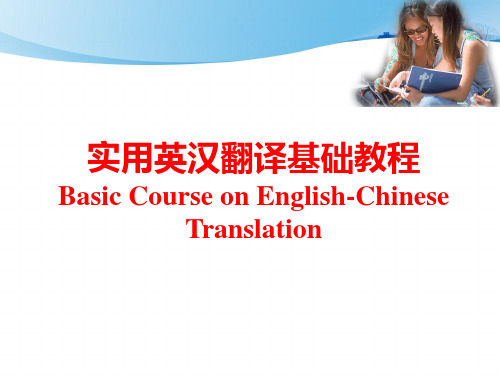
实用英汉翻译基础教程
Basic Course on English-Chinese Translation
词义选择 词义引申 词义褒贬 练习
词义的选择
英汉两种语言都有一词多类、一词多义的现象。一词多类就是指一个词 往往属于几个词类,具有几个不同的意义。一词多义就是说同一个词在 同一个词类中,又往往有几个不同的词义。在英汉翻译过程中,我们在 弄清原句结构后就要善于选择和确定原句中关键词的词义。
“正确的用词同几乎正确的用词之区别就好比闪电同萤火虫之区 别”。 ——马克吐温
选择了恰当的词语,真乃犹如闪电,让你眼前一亮,仿佛看到智慧 的光芒。
I got on horseback within ten minutes after I got your letter. When I got to Canterbury, I got a chaise for town, but I got wet through, and have got such a cold that I shall not get rid of it in a hurry. I got to the Treasury about noon, but first of all got shaved and dressed.
week 7 第四章1词义的选择、引申和褒贬
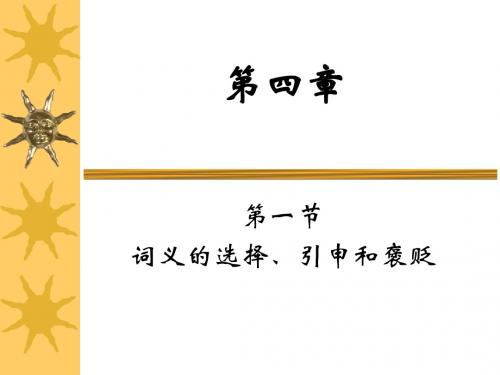
轻音乐 轻微的损失 轻便的汽车 轻松的心情 轻快的脚步 轻浮的举止 轻巧的装备 轻松的工作 轻柔的声音
Reasons for using diction: Polysemy and different collocation
eat soup heavy rain
strong wind
black tea
第四章
第一节 词义的选择、引申和褒贬
一、词义的选译 Diction
By ―diction‖ we mean the proper
choice of words and phrases in
translation on the basis of accurate comprehension of the original.
brown sugar
strong tea prime time
喝汤 大雨 大风 红茶 红糖 浓茶 黄金时间
选择词义的要领
1. 根据词性选择词义
2. 根据上下文及逻辑关系选择词义 3. 根据搭配选择词义
1. 根据词性选择词义
Every penny I earned from the work was
词义的引申主要包括:
– 抽象化引申 – 具体化引申 – 典故的词义引申
2.1 抽象化引申
I was practically on my knees but he still
refused. 我几乎是苦苦哀求,但他依然拒绝。 The two sisters were usually in agreement on most issues, but they were at swords’ points on the matter of abortion. 在很多问题上姐妹俩的意见通常是一致的, 但在人工流产问题上,她们是有激烈争 执的。
翻译方法:词义的选择

1. 词义的选择——误译举例
Translation Practice
Translate the following sentences.
Directions: Translate the following sentences from Chinese into English.
One of the essential points is that you should try to broaden your horizons.
5. 幽默感会有所帮助,有时讲个和自己有关的小笑话也会使谈话轻松 (lighten) 起来。
6. 只有当你愿意交谈并认真地听的时候,你才能成功地与周围的人交朋友。(only when… )
1. 词义的选择 ——根据词汇的褒贬确定词义
要做个好推销员一定要有闯劲才能成功。
侵略成性的国家威胁世界和平。
2) A good salesman must be aggressive if he wants to succeed.
1) Aggressive nations threaten world peace.
词是句子甚至整个语篇的基本构建单位,如何选择恰当的词义,是翻译过程中首先要碰到的问题。只有选择了恰当的词义,并在必要时加以恰如其分的引申,才能确保译文的通顺。英语和汉语的词汇都非常丰富,英语的一词多义,汉语的一字多义的现象十分普遍。译者只有在掌握词典基本释义的基础上,根据具体的语言环境和搭配习惯确定和选择词义,才能进行不同的翻译搭配,并确定词义。
1词义的选择
翻译方法:词义的选择
1. 通过词语的搭配选择 词的搭配关系主要是指词与词之间的横向组合关系,英语和汉语在长期的使用过程中,都形成了各自的组合规律或搭配习惯。因此,在翻译中,可以通过词之间的固定关系选择词及确定词义。以“run”为例:
词义的选择、引申和褒贬1

(三) 根据全文或句子的知识内容
There are known knowns. These are things we know that we know. There are known unknowns. These are things that we know we don’t know. But there are also unknown unknowns. These are things we don’t know. 我们懂得我们知道一些人所知的情况,我们也懂得我们还不知道 众所周知的不可预测的形势,但还存在我们没有意识到我们不懂的 尚未了解的未知局面。
The insurance was invalid for the invalid. 该险种对残疾人无效。形容词,无效的;名词,残疾人
The wind was too strong to wind the soil. 风太大以至于吹不起风帆。名词,风;动词,吹动
The dump was full to refuse more refuse. 垃圾堆已堆满,不能再堆了。动词,拒绝;名词,垃圾
(二) 根据搭配
请让一让。
Excuse me. / Please let me pass. 她让我在雨里等了两个钟头。
She kept me waiting in the rain as long as two hours. 大夫让我卧床。
The doctor advised me to stay in bed. 他把客人让进来。
剧痛 急转弯 激烈的斗争
4. 尖刻,苛刻,易怒: A sharp tongue A sharp temper A sharp criticism
5. 刺骨,刺鼻,刺耳: A sharp frost A sharp smell A sharp voice
英汉互译常用技巧一
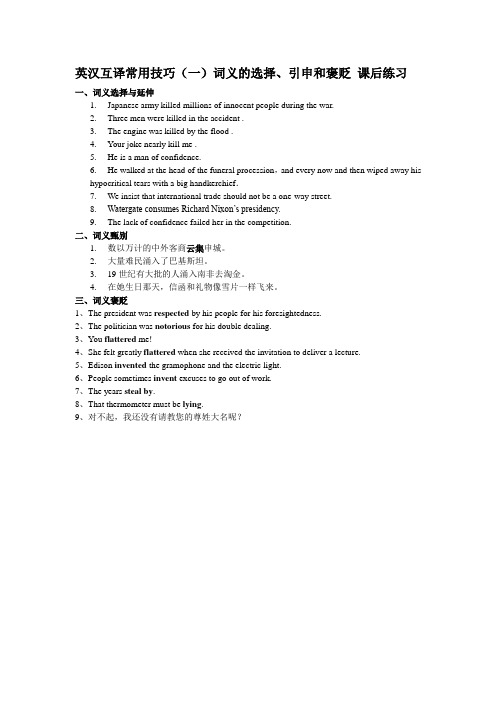
英汉互译常用技巧(一)词义的选择、引申和褒贬课后练习一、词义选择与延伸1.Japanese army killed millions of innocent people during the war.2.Three men were killed in the accident .3.The engine was killed by the flood .4.Y our joke nearly kill me .5.He is a man of confidence.6.He walked at the head of the funeral procession,and every now and then wiped away hishypocritical tears with a big handkerchief.7.We insist that international trade should not be a one-way street.8.Watergate consumes Richard Nixon’s presidency.9.The lack of confidence failed her in the competition.二、词义甄别1.数以万计的中外客商云集申城。
2.大量难民涌入了巴基斯坦。
3.19世纪有大批的人涌入南非去淘金。
4.在她生日那天,信函和礼物像雪片一样飞来。
三、词义褒贬1、The president was respected by his people for his foresightedness.2、The politician was notorious for his double dealing.3、Y ou flattered me!4、She felt greatly flattered when she received the invitation to deliver a lecture.5、Edison invented the gramophone and the electric light.6、People sometimes invent excuses to go out of work.7、The years steal by.8、That thermometer must be lying.9、对不起,我还没有请教您的尊姓大名呢?段落练习:A Translate the underlined part of the following text into English.我想不起来哪一个熟人没有手机。
词义的选择、引申和褒贬
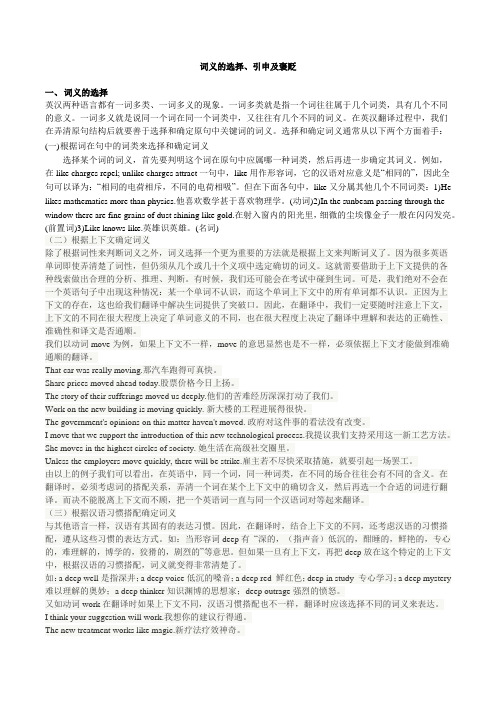
词义的选择、引申及褒贬一、词义的选择英汉两种语言都有一词多类、一词多义的现象。
一词多类就是指一个词往往属于几个词类,具有几个不同的意义。
一词多义就是说同一个词在同一个词类中,又往往有几个不同的词义。
在英汉翻译过程中,我们在弄清原句结构后就要善于选择和确定原句中关键词的词义。
选择和确定词义通常从以下两个方面着手:(一)根据词在句中的词类来选择和确定词义选择某个词的词义,首先要判明这个词在原句中应属哪一种词类,然后再进一步确定其词义。
例如,在like charges repel; unlike charges attract一句中,like用作形容词,它的汉语对应意义是“相同的”,因此全句可以译为:“相同的电荷相斥,不同的电荷相吸”。
但在下面各句中,like又分属其他几个不同词类:1)He likes mathematics more than physics.他喜欢数学甚于喜欢物理学。
(动词)2)In the sunbeam passing through the window there are fine grains of dust shining like gold.在射入窗内的阳光里,细微的尘埃像金子一般在闪闪发亮。
(前置词)3)Like knows like.英雄识英雄。
(名词)(二)根据上下文确定词义除了根据词性来判断词义之外,词义选择一个更为重要的方法就是根据上文来判断词义了。
因为很多英语单词即使弄清楚了词性,但仍须从几个或几十个义项中选定确切的词义。
这就需要借助于上下文提供的各种线索做出合理的分析、推理、判断。
有时候,我们还可能会在考试中碰到生词。
可是,我们绝对不会在一个英语句子中出现这种情况:某一个单词不认识,而这个单词上下文中的所有单词都不认识。
正因为上下文的存在,这也给我们翻译中解决生词提供了突破口。
因此,在翻译中,我们一定要随时注意上下文,上下文的不同在很大程度上决定了单词意义的不同,也在很大程度上决定了翻译中理解和表达的正确性、准确性和译文是否通顺。
翻译时如何注意词义的选择和引申?

翻译时如何注意词义的选择和引申?翻译时如何注意词义的选择和引申?引导语:翻译时如何注意词义的选择和引申?下面就和店铺一起来看看吧。
一、词义如何选择英文中一词多义的现象非常普遍。
例如:英语story一词在不同的上下文中可以有不同的词义:例:It is quite another story now.现在情况完全不同了。
例:The officials concerned refused to confirm the story in the Post. 有关官员拒绝证实《邮报》的这条消息。
例:The white-haired girl’s story is one of the saddest.白毛女的遭遇可算是最悲惨的。
例:A young man came to police station with a story.一个年轻人来到警察局报案。
遇到英语多义词时必须结合上下文反复推敲,切忌望词生义,不求甚解。
尤其遇到多义常用词时,不要想当然地把自己懂得的词义放到文章中去。
例:Albert Einstein, who developed the theory of relativity, arrived at this theory through mathematics.误: 阿尔伯特·爱因斯坦发展了相对论,他是通过数学方法得出这一理论的。
(此处develop应译为“创立”)再以consequence一词为例,考研真题中该词曾出现过三次:Consequence在三句中的分别译为:“推论”“结果”“影响”。
例: consequenceOthers are reasonable consequences of particular advances in science being to some extent self-accelerating. (1996:71) 其他原因则是由于科学在一定程度上自我加速而取得特定发展的必然结果。
科技英语翻译中的词义选择和引申

李铭1张颖21.北京电影学院北京1()()()88;2.中国邮政档案馆北京1()0096摘要:讨论了科技英语翻译中如何正确选择词义和引申词义。
选择词义的根据包括6个方面:词的类别、使用场合、搭配习惯、英美两国语言不同的习惯、单复数词义的差别以及缩写词的全称等。
词义的 引申主要有两种手段:抽象化和具体化。
关键词:科技英语;翻译;词义选择;引申1词义的选择1.1 一词多义任何语言都会普遍地存在一词多 义的现象。
以汉语中的‘‘车” (c h e ) 为例,根据 <现代汉语词典》(商务印书馆1997年修订本)的解释, ‘‘车”字共有以下九个意思Z;)陆地上有轮子的运输工具: 火车、汽车、马车;(2) 利用轮轴旋转的工具车、 滑车、水车;(3) 机器:开车、车间;(4) 车削:车圆、车螺丝钉;(5) 用水车取水:车水;(+)〈方言〉用车运东西:立!;(7) <方言>用^九^^艮:车!;(8) 〈方言-转!(多^^):车;( 9)。
!以上的例子!以!出,一个词 (字)究竟表达怎样的词义,G靠!词(字) 个词 (字) 的,出一■勺语■ ! ‘‘马”!‘‘车”^^‘‘马车”,“开”! ‘‘车:开车”。
词(字)的 语!的语!的有!多,例的!,、、、语、、!。
一个词用在@的语!中,都有词义。
m 词的多义为样一个词,的!的■,^!有以camera 为例,!!^im era , !!!議!为‘疆几”;〇!!!!!为‘‘暑机”,!为以,〇!!!!中以一个 camera !!^上!!有!!!■,〇〇!!‘‘!!机” ■ ‘靨机机:都圓!!!的,■的!!。
〇!的!!!有 projector ,—!!!下!为机”■ ‘‘榻^:画!!!!!为机中,19为 “J H B ”,m的。
又如:‘‘blue movie ” 和 ‘‘bluefilm "1作‘‘黄色^1》",■非‘‘蓝色 _”。
1术语中的blue ,为多义词,除最基本的“蓝色”的意思,以及! 他-些意思之外,在1语中1做‘3亵的”、“亵渎的”、“下流的”、‘‘淫 3的”解,在 “blue movie :和 “bluefilm ”中,blue 取的是这些意思,故译作“黄色若!作“蓝色_”,势必让读者百思解了。
词义的选择、引申和褒贬
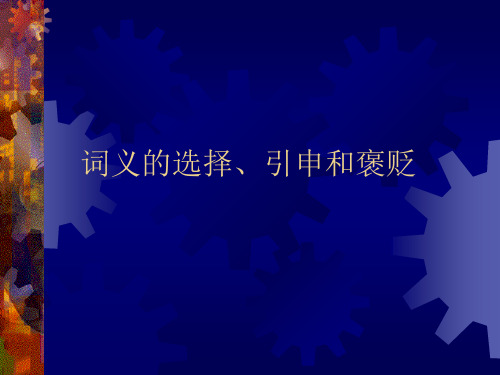
一、词义的选择( diction/ choice of words)
英汉两种语言都有一词多类、 一词多义现象。 1.一词多类是说一个词往往属 于多个词类,具有几个不同的 意义。 2.一词多义是说同一个词在同 一词类中,往往有几个不同的 词义。
(一)根据词在句子中的词类 选择和确定词义。
2)He is a Shylock! Shylock是莎士比亚 笔下的人物,其人刻薄歹毒, 故该句引申译为:他凶险狡诈。
Every life has its roses and thorns. 这里把玫瑰和刺引申,译为: “每个人的生活有苦有甜。”
2、将带有特征性形象的词译 成该形象所代表的属性的词。
1) Rich and powerful, he always goosesteps on the street. Goosestep的原义是从名词 “鹅步、正步” 转化而来的动 词,根据上下文引申,译成: “他有钱有势,在街上总是耀 武扬威,横行霸道。”
2)He is in critical condition, see-sawing between life and death. See-saw原义是“跷跷板”, 这里引申译为:他的病况危急, 时好时坏,与死神搏斗。
2. 用贬义表达
1)Hitler’s ambition to overran the whole Europe and the whole world was seen clearly. 希特勒要征服整个欧洲乃至全世界的狼子 野心暴露无遗。 2)If the prisoner were brave enough to escape, just shoot him dead. 假若囚犯胆敢逃跑,就把他击毙。 3)He is so proud that he always look down upon all his classmates. 他十分傲慢,看不起所有同学。
第一节 词义的选择和引申
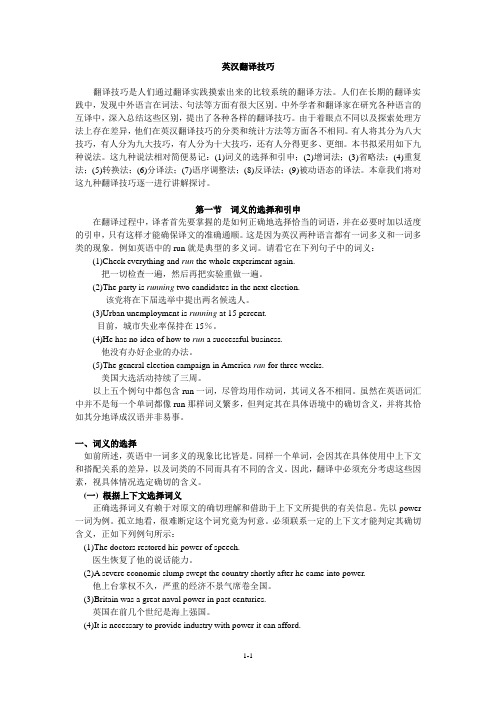
英汉翻译技巧翻译技巧是人们通过翻译实践摸索出来的比较系统的翻译方法。
人们在长期的翻译实践中,发现中外语言在词法、句法等方面有很大区别。
中外学者和翻译家在研究各种语言的互译中,深入总结这些区别,提出了各种各样的翻译技巧。
由于着眼点不同以及探索处理方法上存在差异,他们在英汉翻译技巧的分类和统计方法等方面各不相同。
有人将其分为八大技巧,有人分为九大技巧,有人分为十大技巧,还有人分得更多、更细。
本书拟采用如下九种说法。
这九种说法相对简便易记:(1)词义的选择和引申;(2)增词法;(3)省略法;(4)重复法;(5)转换法;(6)分译法;(7)语序调整法;(8)反译法;(9)被动语态的译法。
本章我们将对这九种翻译技巧逐一进行讲解探讨。
第一节词义的选择和引申在翻译过程中,译者首先要掌握的是如何正确地选择恰当的词语,并在必要时加以适度的引申,只有这样才能确保译文的准确通顺。
这是因为英汉两种语言都有一词多义和一词多类的现象。
例如英语中的run就是典型的多义词。
请看它在下列句子中的词义:(1)Check everything and run the whole experiment again.把一切检查一遍,然后再把实验重做一遍。
(2)The party is running two candidates in the next election.该党将在下届选举中提出两名候选人。
(3)Urban unemployment is running at 15 percent.目前,城市失业率保持在15%。
(4)He has no idea of how to run a successful business.他没有办好企业的办法。
(5)The general election campaign in America ran for three weeks.美国大选活动持续了三周。
以上五个例句中都包含run一词,尽管均用作动词,其词义各不相同。
第二篇第一章-词义

19
soft
1. soft pillow 2. soft music 3. soft fire 4. soft wood 5. soft money 6. soft drink 7. soft breeze 8. soft light 9. soft words 10. soft heart
答案:She is greatly/deeply respected by everyone. 错误:by us 答案:It is rumored that the accident was due to/because of/caused by his negligence. the accident happened for his negligence?
enticing; I hate her with an E, because she's
engaged; I took her to the sign of the exquisite, and
treated her with an elopement; her name's Emily, and
1. He had been stricken with a heart attack earlier in the afternoon. 2. Visitors are requested not to touch the exhibits. 3. She and her husband have been asked out for the banquet.
穿T恤 戴墨镜 戴戒指 穿鞋子 戴帽子 戴手表 洒香水 围围巾 留胡子
17
B.形容词和名词的搭配
- 1、下载文档前请自行甄别文档内容的完整性,平台不提供额外的编辑、内容补充、找答案等附加服务。
- 2、"仅部分预览"的文档,不可在线预览部分如存在完整性等问题,可反馈申请退款(可完整预览的文档不适用该条件!)。
- 3、如文档侵犯您的权益,请联系客服反馈,我们会尽快为您处理(人工客服工作时间:9:00-18:30)。
• 英汉两种语言都有一词多类、一词多 义的现象。
• 一词多类就是指一个词往往属于几个 词类,具有几个不同的意义。
• 一词多义就是说同一个词在同一个词 类中,又往往有几个不同的词义。
• 见课本第5-6页例句
1.根据词性判断词义
• book:在作名词时,意思是“书,书 籍”;用作动词却常表示“预订,预 约”的意思。
• 人才外流一直是埃及的头号问题,实 际上,它已经成为那一地区带普遍性 的严峻问题。
词义的具体化引申
• 词义的具体化是指把原义抽象笼统的 词语,根据目标语的表达习惯,引申 为意义明确具体的词语。
词义的具体化引申
• The car in front of me stopped, and I missed the green. • 我前面的车停住了,我错ed at the head of the funeral procession,and every now and then wiped away his hypocritical tears with a big handkerchief.
• 他走在送葬队伍的前面,不时用一条 大手绢抹去他鳄鱼的眼泪。
4.根据词义的褒贬确定词义
• Edison invented the gramophone and the electric light. • 爱迪生发明了留声机和电灯。 • People sometimes invent excuses to go out of work. • 人们有时编造借口不去上班。
3.根据汉语习惯搭配确定词义
She worked her way to the front.
她好不容易才挤到前面。 The root of the pine tree worked down between the stones. 松树的树根在石缝间扎下去。 The new regulation is working well. 新规定执行得很顺利。
词义的抽象化引申
• 词义的抽象化是指是将表示具体形象 的词作概括性的引申,译成意义抽象 的词。
• 现代英语常用表示具体形象的词指代 一种属性、一种概念或一个事物,翻 译时宜作抽象化的处理,使译文更加 自然流畅。
词义的抽象化引申
I have no head for mathematics. 我没有数学方面的天赋。
• while:作连词时,有 “当...的时候, 而,虽然”等意思;作名词时,却指 “片刻,一会儿”;
1.根据词性判断词义
• can:作情态动词表示可以,能; 作名词表示罐子,罐头; 作动词表示做成罐头; 作量词表示罐,听
2、根据上下文确定词义
• Share prices moved ahead today. • 股票价格今日上扬。 • The story of their sufferings
词义的具体化引申
• There is more to their life than political and social and economic problem, more than transient(暂时 的) everydayness.
• 译:他们的生活远不止那些政治的、 社会的和经济的问题,远不止一时的 柴米油盐问题。
• The corrections were marked in red. • 修改的地方都用红笔标出。
词义的具体化引申
• Perhaps the only trouble with copper is that it is not hard enough for some uses. • 就某些用途来说,铜的唯一缺点也许 是硬度不够。
• The interest rates have seesawed between 10 and 15 percent. • 利率一直在10%到15%之间不断波动。
词义的抽象化引申
• Brain drain has been Egypt’s No.1 concern; as a matter of fact, it has been an epidemic in that area.
moved us deeply. • 他们的苦难经历深深打动了我们。 • Work on the new building is
moving quickly. • 新大楼的工程进展得很快。
2、根据上下文确定词义
The government's opinions on this matter haven't moved. 政府对这件事的看法没有改变。
Unless the employers move quickly, there will be strike. 雇主若不尽快采取措施,就要引起一场罢 工。
2、根据上下文确定词义
• She shook his hand and went upstairs. • 她和他握了一下手,就上楼去 了。 • Mary writes a good hand. • 玛丽写得一手好字。 • His hand is out. • 他的的技能荒疏了。
词义的引申
• 词义的引申是指在一个词所具有的原 始意义的基础上,根据上下文和逻辑 关系进一步加以引申,选择适当确切 的目标语词语来表达,避免生搬硬套 地逐句死译,使译文更加通顺流畅。
词义的引申
• American beauty • 不是“美国美女”而是“四季开花的红蔷 薇” • China rose • 不是“中国玫瑰”而是“月季花” • English disease • 不是“英国病”而是“软骨病” • China (or Chinese) ink • 不是“中国墨水”而是“墨汁”
Every life has its roses and thorns. 每个人的生活有苦有甜。
词义的抽象化引申
• We insist that international trade should not be a one-way street.
• 我们坚持主张国际贸易不应是有来无 往。
词义的抽象化引申
3.根据汉语习惯搭配确定词义
a deep well 深井; a deep voice 低沉的嗓音; deep in study 专心学习; a deep mystery 难以理解的奥妙; a deep thinker 深刻的思想家;
3.根据汉语习惯搭配确定词义
I think your suggestion will work. 我想你的建议行得通。 The new treatment works like magic. 新疗法疗效神奇。 My watch doesn’t work. 我的表不走了。
2、根据上下文确定词义
• My hands are tied. • 我的权力极其有限。 • The hands of a clock or watch show the time. • 钟或表的指针是指示时间的。 • That company was short of hands. • 那家公司还缺雇员。
4.根据词义的褒贬确定词义
1) Aggressive nations threaten world peace. 侵略成性的国家威胁世界和平。
2) A good salesman must be aggressive if he wants to succeed. 要做个好推销员一定要有闯劲才能成 功经验。
